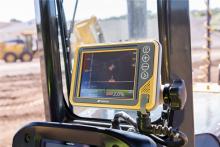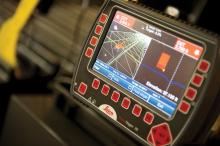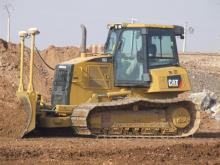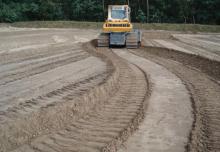Advances with machine control technologies are providing major benefits right across the construction sector - Mike Woof writes
With the massive bauma 2016 exhibition now having run its course, the construction sector look set to benefit from a range of new machine control technologies. These systems are being offered across a range of different segments in the equipment sector. Bulldozing was one of the first portions of the earthmoving segment to benefit from machine control systems, but a vast array o
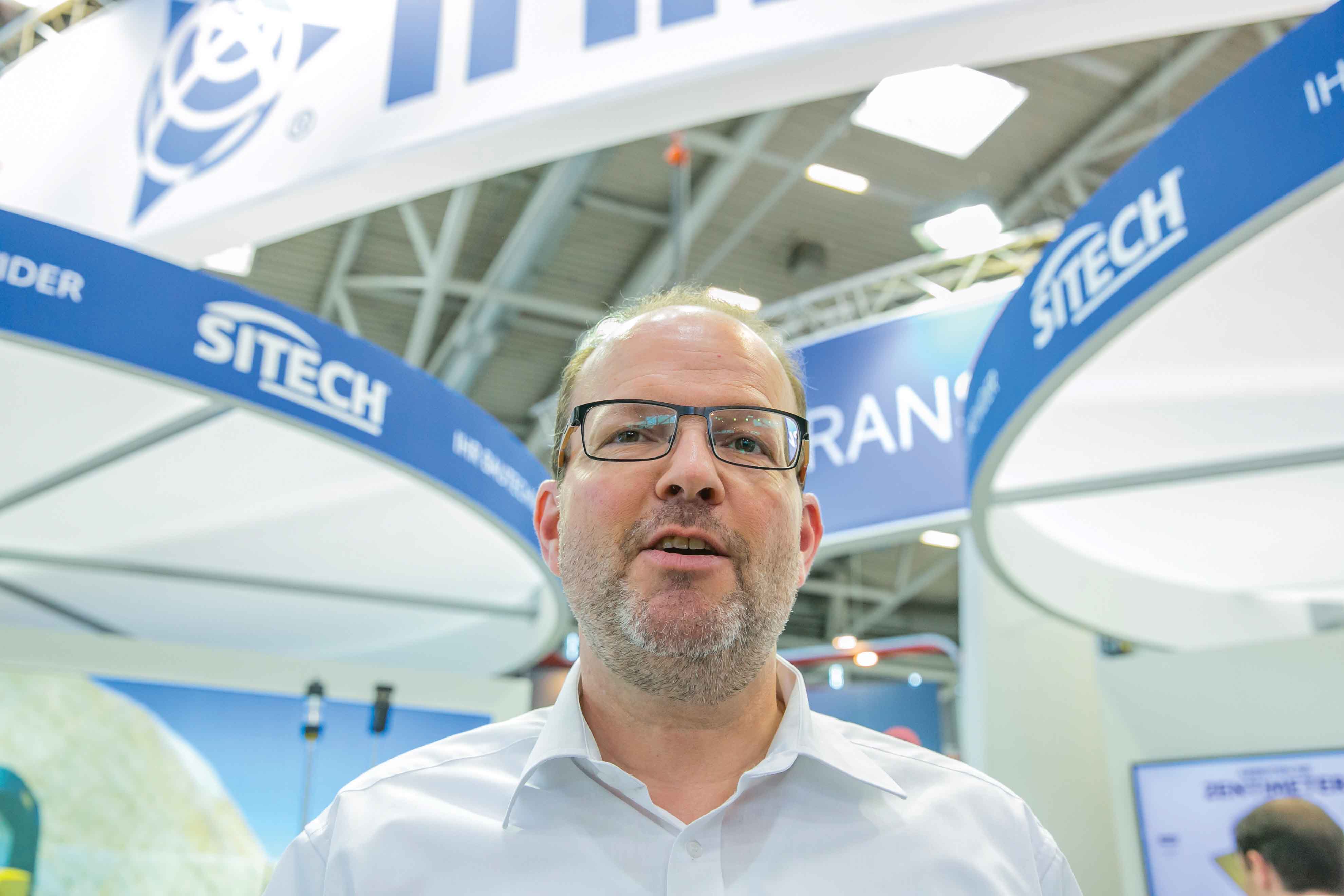
Trimble technologies are now available through and supported by the Sitech network
Advances with machine control technologies are providing major benefits right across the construction sector - Mike Woof writes
With the massive bauma 2016 exhibition now having run its course, the construction sector look set to benefit from a range of new machine control technologies. These systems are being offered across a range of different segments in the equipment sector. Bulldozing was one of the first portions of the earthmoving segment to benefit from machine control systems, but a vast array of systems are now available for other type of earthmovers. And there are also systems for other categories of construction equipment too, such as road building machines.
However the technology has now gone far beyond the single machines themselves, allowing users to utilise original design files for machine guidance, view equipment status in real time, gather data on work carried out and integrate on-site operations more fully. Recovered data can also be added to the original design files and within the final project model, showing what work has been carried out, and where.
265 Leica Geosystems is now offering packages that help construction users take a more general view of site operations. The firm’s iCON MCH100 and Telematics machine monitoring systems make it possible to know what any type of earthmoving machine is doing anytime and anywhere, whether in a quarry or on a construction site.
The iCON MCH100 unit can provide real-time location of machinery and can be attached to a piece of equipment in a non-invasive fashion, with no calibration needed. This is achieved by wireless connectivity, allowing it to be linked to any type of earthmoving equipment and from any manufacturer, while the unit can cope with being used for long hours of operation in rugged conditions.
The firm’s ICON Telematics package takes the information for analysis, which can then be presented visually for personnel. The system can monitor overtime and off-schedule activity, as well as use projected schedules to easily identify costly overtime. For multiple site managers and owners, the iCON Telematics system can compare performance across projects, regions and other groupings. It can also be accessible from any internet-connected device.
Meanwhile aimed at use on road paving operations,1228 MOBA Mobile Automation’s new Pave-TM sensor technology can be used for accurate asphalt thickness measurement. The company claims the system will make the consumption of materials in road construction more efficient and sustainable in the future, providing a significant saving in terms of costs.
At present, a widely used method for an asphalt paving crew is to check the layer thickness using a ruler and these measurements will be carried out repeatedly by one of the team during the paving process. After each measurement, the layer thickness may be readjusted and any measurement errors recognised and corrected.
However, depending on the regularity and accuracy in measurements, the results can make drastic changes to the road, affecting the whole construction project. More sophisticated technologies are available and the new Pave-TM layer thickness detection system can boost accuracy. Equipping pavers with a sonic sensor on the tow arm and main screed for thickness measurement can increase paver efficiency and also reduce asphalt costs immensely.
Both sensors measure, within millimetre accuracy, the ground in front of the screed, as well as the freshly laid asphalt behind the screed. A special algorithm calculates deviations of the reference layer’s thickness, showing real-time values on a display.
The firm says that this system allows ongoing, as well as automatic control of layer thickness. By the use of real-time values, deviations over screed control can be corrected and optimised, according to MOBA.
From342 Topcon Positioning comes a new range of machine control technologies aimed at use with equipment such as bulldozers and excavators, including both entry level indicate technologies and more sophisticated 3D systems.
The new GX-55 control box offers efficient, machine-controlled excavation capabilities. Along with the release of the GX-55, Topcon is launching three new 2D and 3D systems to its line of excavation solutions. These are the X-52 as well as the X-53 and X-53i. In any solution, the GX-55 system provides users with new visual and audible features to achieve grade safely and efficiently for 2D or 3D excavating tasks.
The firm says that the GX-55 is a robust tool that delivers high-quality graphics for machine control. It can link with the Sitelink3D system to send job activities to managers in real-time, providing accurate project information. It has an LCD touchscreen with integrated LED light bars and is designed for continuous grade reference of the bucket teeth.
With the X-52 as well as the X-53 and X-53i packages, Topcon customers have a choice of 2D, 3D, or 3D indicate machine controlled excavation systems. Meanwhile the GX-55 is a lightweight package designed for easy transfer between machines. It has a large sunlight-viewable and colour LCD touchscreen surrounded by integrated LED light bars giving a continuous grade reference of the bucket teeth. Additional features include customisable audible tones for grade reference, integrated virus protection, and USB ports for saving and downloading job files.
At the high end of the firm’s range is its new e X-63 LPS package, which is equipped with local positioning system capabilities. The firm says that the X-63 LPS is designed to provide a solution for machine-controlled excavation in areas where satellite positioning may be obstructed, such as close to high buildings, deep quarries or tunnels. The user can provide guidance with a total station and prism for precision. The package is also versatile when GNSS positioning is available with the new Topcon MC-i4 receiver. Operators can select which type of sensor to best use for the project and the system is also compatible with the new Topcon GX-55 control box.
The firm’s latest indicate dozer machine control system is the i-53 package and comes with the latest Topcon GNSS receiver, graphical user interface, and machine control software. The company claims that this package offers a versatile indicate dozer system for an affordable price.
The system expands the Topcon dozer indicate product line by offering single GNSS plus single or dual axis slope sensor configurations for complete control of elevation and slope. The i-53 features the Topcon GX-55 control box with audible grade reference alarms and visual LED lights, as well as the new MC-i4 GNSS receiver. It features a high-quality screen and clear grade guidance options that are said to make it easy to use.
Communications for the machine are handled by the innovative MC-i4 GNSS receiver. This allows various radio configurations in one receiver for the Sitelink3D site management solution and/or network corrections. The firm says that by using slope sensors in an indicate system the system improves blade cutting edge position and angle, boosting the grading capabilities of the dozer.
Additional features include integrated virus protection and easy-access USB ports for saving and downloading job files.
A key development from2122 Trimble is that it is increasing its cooperation with a number of major construction equipment manufacturers. Customers for certain machines from 695 Doosan, 236 Hyundai and 359 Volvo CE will now be able to specify Trimble tools.
Customers in Europe and North America will have the option to order a Trimble Ready Doosan DX225LC-5 excavator from the factory. This new Trimble Ready excavator enables a faster and simplified installation of Trimble GCS900 2D or 3D Grade Control System components with no welding, repainting, drilling or disassembly required.
Doosan Infracore says that its customers in Europe and North America will be able to order a DX225LC-5 excavator straight from the factory that is a Trimble ready excavator. Because the system is installed in the factory, this means there is no need for machine downtime for fitting the GCS900 system. The Trimble Ready Doosan Infracore DX225LC-5 excavator is expected to be available in the second half of 2016 through Doosan’s distribution network in Europe and North America.
In a similar vein, Hyundai Heavy Industries (HHI) will also integrate, engineer and market the Trimble Ready factory fit machine control kits so that the GCS900 Grade Control System components can be fitted to certain models of excavators in the aftermarket. The fast and simplified installation process eliminates the requirement for drilling, welding, repainting or disassembly when installing either a Trimble GCS900 2D or GCS900 3D machine guidance solution, which can reduce machine downtime.
And Trimble and Volvo CE now have an integration agreement focusing on establishing a Trimble 3D machine control solution. This will allow the Trimble technology to be integrated with Volvo Dig Assist 2D machine control on Volvo excavators. Integrating the Trimble 3D machine control solution on Volvo Excavators will complement the Volvo Dig Assist capability to enable the use of 3D constructible models, as-built data and other Trimble Connected Site technologies.
According to Trimble these moves will provide major benefits for construction machine customers, allowing contractors to improve competitiveness, efficiency and productivity. Integrating Trimble solutions with construction machines allows the customer base to leverage this sophisticated technology in their businesses.
The Trimble GCS900 Grade Control System is a machine control system for earthworks that makes design surfaces, grades and alignments accessible to the operator on a display inside the cab. The system uses GNSS, GPS, laser, sonic or total station technology to accurately position the blade or bucket in real-time, significantly reducing material overages and improving the contractor's productivity and efficiency. In addition, Trimble has said that the purchase of a complete Trimble GCS900 Grade Control System will include six months of Trimble Connected Site services at no additional cost if activated by June 30th, 2017. The spread of new technologies from Trimble offers contractors an array of sophisticated tools. According to the firm, integrating grade control data communications, remote GNSS corrections and telematics, the firm’s Connected Site system helps to optimise asset productivity and reduce operational costs.
The company claims that contractors can better remotely manage assets and projects from the office and machine operators can stay up-to-date with the latest design files, work orders, and training without having to leave a machine. Trimble Connected Site services include the Web-based Connected Community and VisionLink solutions.
The Connected Community is the key connection for the Trimble Connected Site, allowing contractors to share data in real-time through the internet. Using Connected Community, contractors can organise crews, devices and sites from the office, and also view and interact with Trimble machine control and Site Positioning Systems that are in use, allowing troubleshooting of problems and training of personnel. The accurate information the technology provides between the office and the construction site also allows managers more time to make better decisions.
The VisionLink system integrates site productivity data, fleet and asset management, and materials and volumes movement information. VisionLink can deliver a collective view of all machines and the overall productivity across a company and on different sites at the same time. In addition, VisionLink gives contractors the ability to view asset and productivity data on mobile devices.
With the massive bauma 2016 exhibition now having run its course, the construction sector look set to benefit from a range of new machine control technologies. These systems are being offered across a range of different segments in the equipment sector. Bulldozing was one of the first portions of the earthmoving segment to benefit from machine control systems, but a vast array of systems are now available for other type of earthmovers. And there are also systems for other categories of construction equipment too, such as road building machines.
However the technology has now gone far beyond the single machines themselves, allowing users to utilise original design files for machine guidance, view equipment status in real time, gather data on work carried out and integrate on-site operations more fully. Recovered data can also be added to the original design files and within the final project model, showing what work has been carried out, and where.
The iCON MCH100 unit can provide real-time location of machinery and can be attached to a piece of equipment in a non-invasive fashion, with no calibration needed. This is achieved by wireless connectivity, allowing it to be linked to any type of earthmoving equipment and from any manufacturer, while the unit can cope with being used for long hours of operation in rugged conditions.
The firm’s ICON Telematics package takes the information for analysis, which can then be presented visually for personnel. The system can monitor overtime and off-schedule activity, as well as use projected schedules to easily identify costly overtime. For multiple site managers and owners, the iCON Telematics system can compare performance across projects, regions and other groupings. It can also be accessible from any internet-connected device.
Meanwhile aimed at use on road paving operations,
At present, a widely used method for an asphalt paving crew is to check the layer thickness using a ruler and these measurements will be carried out repeatedly by one of the team during the paving process. After each measurement, the layer thickness may be readjusted and any measurement errors recognised and corrected.
However, depending on the regularity and accuracy in measurements, the results can make drastic changes to the road, affecting the whole construction project. More sophisticated technologies are available and the new Pave-TM layer thickness detection system can boost accuracy. Equipping pavers with a sonic sensor on the tow arm and main screed for thickness measurement can increase paver efficiency and also reduce asphalt costs immensely.
Both sensors measure, within millimetre accuracy, the ground in front of the screed, as well as the freshly laid asphalt behind the screed. A special algorithm calculates deviations of the reference layer’s thickness, showing real-time values on a display.
The firm says that this system allows ongoing, as well as automatic control of layer thickness. By the use of real-time values, deviations over screed control can be corrected and optimised, according to MOBA.
From
The new GX-55 control box offers efficient, machine-controlled excavation capabilities. Along with the release of the GX-55, Topcon is launching three new 2D and 3D systems to its line of excavation solutions. These are the X-52 as well as the X-53 and X-53i. In any solution, the GX-55 system provides users with new visual and audible features to achieve grade safely and efficiently for 2D or 3D excavating tasks.
The firm says that the GX-55 is a robust tool that delivers high-quality graphics for machine control. It can link with the Sitelink3D system to send job activities to managers in real-time, providing accurate project information. It has an LCD touchscreen with integrated LED light bars and is designed for continuous grade reference of the bucket teeth.
With the X-52 as well as the X-53 and X-53i packages, Topcon customers have a choice of 2D, 3D, or 3D indicate machine controlled excavation systems. Meanwhile the GX-55 is a lightweight package designed for easy transfer between machines. It has a large sunlight-viewable and colour LCD touchscreen surrounded by integrated LED light bars giving a continuous grade reference of the bucket teeth. Additional features include customisable audible tones for grade reference, integrated virus protection, and USB ports for saving and downloading job files.
At the high end of the firm’s range is its new e X-63 LPS package, which is equipped with local positioning system capabilities. The firm says that the X-63 LPS is designed to provide a solution for machine-controlled excavation in areas where satellite positioning may be obstructed, such as close to high buildings, deep quarries or tunnels. The user can provide guidance with a total station and prism for precision. The package is also versatile when GNSS positioning is available with the new Topcon MC-i4 receiver. Operators can select which type of sensor to best use for the project and the system is also compatible with the new Topcon GX-55 control box.
The firm’s latest indicate dozer machine control system is the i-53 package and comes with the latest Topcon GNSS receiver, graphical user interface, and machine control software. The company claims that this package offers a versatile indicate dozer system for an affordable price.
The system expands the Topcon dozer indicate product line by offering single GNSS plus single or dual axis slope sensor configurations for complete control of elevation and slope. The i-53 features the Topcon GX-55 control box with audible grade reference alarms and visual LED lights, as well as the new MC-i4 GNSS receiver. It features a high-quality screen and clear grade guidance options that are said to make it easy to use.
Communications for the machine are handled by the innovative MC-i4 GNSS receiver. This allows various radio configurations in one receiver for the Sitelink3D site management solution and/or network corrections. The firm says that by using slope sensors in an indicate system the system improves blade cutting edge position and angle, boosting the grading capabilities of the dozer.
Additional features include integrated virus protection and easy-access USB ports for saving and downloading job files.
A key development from
Customers in Europe and North America will have the option to order a Trimble Ready Doosan DX225LC-5 excavator from the factory. This new Trimble Ready excavator enables a faster and simplified installation of Trimble GCS900 2D or 3D Grade Control System components with no welding, repainting, drilling or disassembly required.
Doosan Infracore says that its customers in Europe and North America will be able to order a DX225LC-5 excavator straight from the factory that is a Trimble ready excavator. Because the system is installed in the factory, this means there is no need for machine downtime for fitting the GCS900 system. The Trimble Ready Doosan Infracore DX225LC-5 excavator is expected to be available in the second half of 2016 through Doosan’s distribution network in Europe and North America.
In a similar vein, Hyundai Heavy Industries (HHI) will also integrate, engineer and market the Trimble Ready factory fit machine control kits so that the GCS900 Grade Control System components can be fitted to certain models of excavators in the aftermarket. The fast and simplified installation process eliminates the requirement for drilling, welding, repainting or disassembly when installing either a Trimble GCS900 2D or GCS900 3D machine guidance solution, which can reduce machine downtime.
And Trimble and Volvo CE now have an integration agreement focusing on establishing a Trimble 3D machine control solution. This will allow the Trimble technology to be integrated with Volvo Dig Assist 2D machine control on Volvo excavators. Integrating the Trimble 3D machine control solution on Volvo Excavators will complement the Volvo Dig Assist capability to enable the use of 3D constructible models, as-built data and other Trimble Connected Site technologies.
According to Trimble these moves will provide major benefits for construction machine customers, allowing contractors to improve competitiveness, efficiency and productivity. Integrating Trimble solutions with construction machines allows the customer base to leverage this sophisticated technology in their businesses.
The Trimble GCS900 Grade Control System is a machine control system for earthworks that makes design surfaces, grades and alignments accessible to the operator on a display inside the cab. The system uses GNSS, GPS, laser, sonic or total station technology to accurately position the blade or bucket in real-time, significantly reducing material overages and improving the contractor's productivity and efficiency. In addition, Trimble has said that the purchase of a complete Trimble GCS900 Grade Control System will include six months of Trimble Connected Site services at no additional cost if activated by June 30th, 2017. The spread of new technologies from Trimble offers contractors an array of sophisticated tools. According to the firm, integrating grade control data communications, remote GNSS corrections and telematics, the firm’s Connected Site system helps to optimise asset productivity and reduce operational costs.
The company claims that contractors can better remotely manage assets and projects from the office and machine operators can stay up-to-date with the latest design files, work orders, and training without having to leave a machine. Trimble Connected Site services include the Web-based Connected Community and VisionLink solutions.
The Connected Community is the key connection for the Trimble Connected Site, allowing contractors to share data in real-time through the internet. Using Connected Community, contractors can organise crews, devices and sites from the office, and also view and interact with Trimble machine control and Site Positioning Systems that are in use, allowing troubleshooting of problems and training of personnel. The accurate information the technology provides between the office and the construction site also allows managers more time to make better decisions.
The VisionLink system integrates site productivity data, fleet and asset management, and materials and volumes movement information. VisionLink can deliver a collective view of all machines and the overall productivity across a company and on different sites at the same time. In addition, VisionLink gives contractors the ability to view asset and productivity data on mobile devices.


